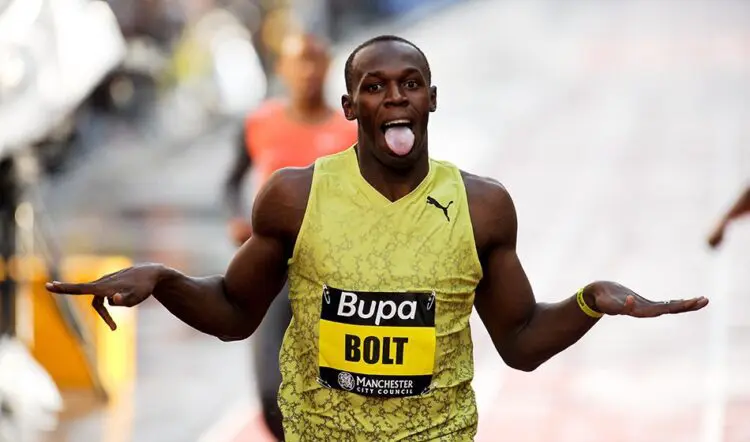AW promotion.
Sixteen years have passed since Usain Bolt blazed around Berlin's track, setting world records that seemed almost supernatural at the time. The 9.58 in the 100m and 19.19 in the 200m weren't just fast - they were otherworldly performances that redefined what human speed could look like. Today, as the world championships approach, those marks remain as distant as ever.
The Jamaican legend isn't losing sleep over anyone threatening his legacy anytime soon. Speaking at a recent Puma event in Tokyo, Bolt made it clear he doesn't see today's sprinters getting close to his times. His confidence isn't arrogance - it's based on what he's watching unfold on tracks around the world.
What makes Bolt's assessment particularly striking is how much attention these sprint events still generate. Major championships draw massive audiences, and that popularity shows up clearly in the betting markets. Sprint finals consistently rank among the most wagered-on events at world championships and Olympics. Fans get invested in split-second margins and photo finishes in ways that other sports can't match. This popularity and engagement in sports betting have led many online gambling platforms to expand their athletics coverage, with some now also accepting crypto payment methods including options to accommodate the sport's growing global fanbase (Source: https://99bitcoins.com/bitcoin-wallet/sports-betting)
The numbers tell a clear story for anyone hoping to challenge Bolt's supremacy. Since 2009, only Yohan Blake has managed to break 9.70 in the 100 metres back in 2012, and Blake remains the sole runner to dip under 19.30 in the 200. These aren't just statistical footnotes - they represent massive gaps in a sport where improvements are typically measured in hundredths of seconds.

Noah Lyles represents the current generation's best hope for threatening Bolt's legacy. The American sprinter has been vocal about his ambitions, suggesting he could run 9.65 and 19.10 during his peak years. Lyles backed up his confidence by sweeping the 100 and 200 meters at the 2023 world championships, channeling Bolt's signature ability to perform when global attention focused on him. But his personal best of 19.31 in the 200 still sits outside Bolt's realm.
This year's world championships feature Jamaica's Kishane Thompson as the season's fastest 100-meter runner with his 9.75 clocking. Thompson's time represents excellent sprinting by any historical standard, yet it falls short of even cracking the all-time top 10 list. His emergence alongside teammate Oblique Seville gives Jamaica hope for reclaiming sprint dominance, and Bolt clearly believes his homeland will deliver when medals are distributed.
The most intriguing challenger comes from Australia's teenage sensation Gout Gout. The 17-year-old's upright running style and impressive frame draw inevitable comparisons to Bolt's physical attributes during his developmental years. More significantly, Gout's current times actually exceed where Bolt was at the same age. But Bolt offers a reality check about the transition from junior to senior competition, emphasizing how coaching and support systems become crucial during those formative years.
Training methods have advanced dramatically since Bolt's retirement. Track surfaces have improved, and running spikes have become technological marvels that can shave precious hundredths off sprint times. Puma's own research suggests Bolt would have run 9.42 wearing today's footwear technology during that legendary Berlin performance. Yet even with all these advantages, current sprinters are nowhere near his marks.
Bolt's relaxed attitude toward his records reflects a deeper understanding of athletic greatness. He acknowledges that everything changes, including human performance capabilities. Equipment improvements, training methodologies, and nutritional sciences all contribute to faster times across every distance. His records will eventually fall - the laws of sporting progress virtually guarantee it. The question isn't whether someone will run faster than 9.58 and 19.19, but when and who will achieve these breakthroughs.
Technology also continues advancing at remarkable speeds, from track surfaces that provide better energy return to spikes designed with space-age materials. Advanced biomechanical analysis now helps coaches optimize every aspect of sprint technique, while sports science provides insights that were unavailable during Bolt's era. These improvements make sub-9.60 and sub-19.20 performances mathematically probable within the next decade.
The upcoming world championships will provide another test of where current sprinting stands relative to Bolt's legendary marks. Thompson, Lyles, and the other contenders will have their chance to make statements about the future of the sport. Athletics enthusiasts worldwide will be watching to see if anyone can take meaningful steps toward those seemingly untouchable times.
